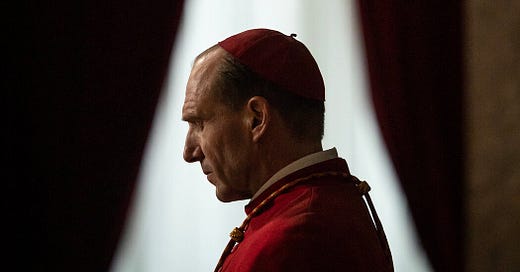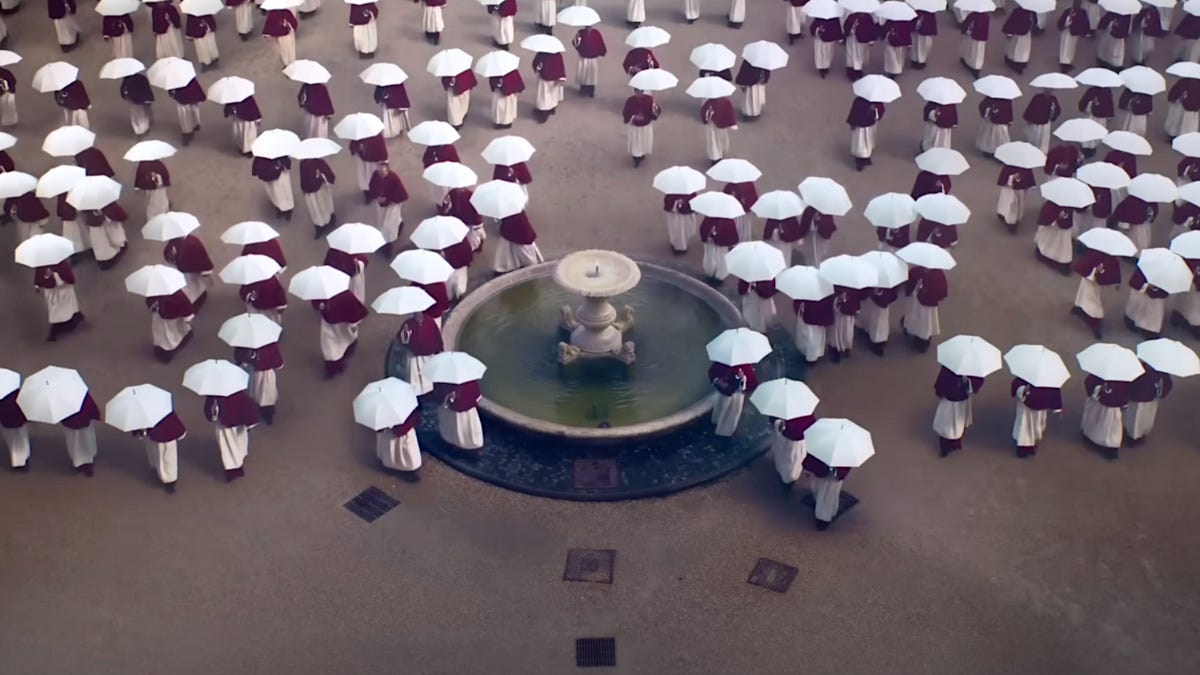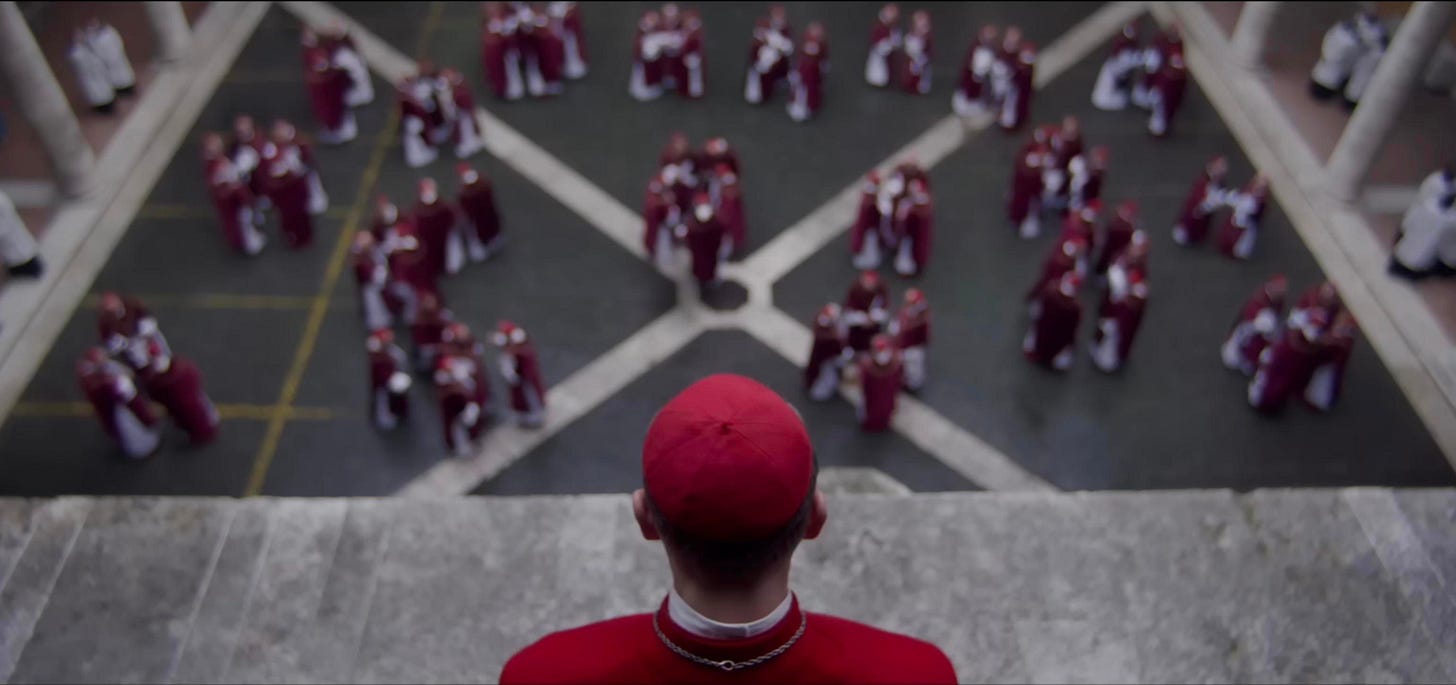[Spoilers for Conclave ahead.]
There are many ways to assess a film. One can judge its cinematic merits. One could examine its treatment of complex concepts or challenging source material, of moral or philosophical concepts. And then there’s good old-fashioned entertainment value.
I can’t think of the last time that I’ve felt so conflicted across all of these spectrums before watching Conclave.
Cinematically, it’s a brilliant case study in the art of making people talking to each other in small rooms gripping, a la 12 Angry Men. The movie opens with the death of the last pope, an unnamed liberal reformer with a striking resemblance to Pope Francis from the few times he is seen fleetingly. Right from the opening shots, the situation is treated with gravity and solemnity. A strings-heavy score builds tension as the characters pray in Latin and a grieving cardinal struggles to pry the papal ring off of the dead pontiff’s hand. Some of these images linger strikingly - the regalia of the church hierarchy, Rome in her splendor, the umbrellas of the college of cardinals as they cross St. Peter’s Square. It’s one of the most beautiful-looking movies I’ve seen in a while. The use of light and shadow throughout the film was particularly notable - at times, reminiscent of Caravaggio. The sets are also fantastic. The Sistine Chapel, in particular, is represented in pristine detail. While not shot on location, an old Sistine Chapel set at the Cinecittà Studios (of Ben Hur and Roman Holiday fame) in Rome was refurbished for the production.
The cast is also superb. Ralph Fiennes delivers a fantastic performance as Cardinal Lawrence (Lomeli in the novel, Italian changed to English, one of several nationality swaps in the film), a “manager, not a shepherd,” who serves as the Dean of the College of Cardinals. Fiennes excels in playing men “on the edge” (see The Menu) and this character is one such - a man overwhelmed by the bureaucracy and backstabbing of a role that should ideally be one of spiritual leadership. His crises of faith and conscience are often compelling, providing a fascinating main character in this story. Lawrence is joined by an ensemble of other well-cast characters - of particular note are the fast-talking American Cardinal Bellini (the most Stanley Tucci role Stanley Tucci has ever played), and the soft-spoken but gently menacing Canadian Cardinal Tremblay (John Lithgow). Not any priest is elevated to the rank of bishop, and fewer still are elevated to cardinal - and it was interesting seeing these actors’ interpretations of the traits and personalities of the princes of the Church (Bellini at times reminded me of a liberalized Cardinal Timothy Dolan).
Where the film falters, to varying effects, is in its writing and treatment of its sources.
I found the 2016 source novel by Robert Harris (who is also a producer on the movie) to be an earnest, if shallow, thriller. A breezy read (I think I read it in a sitting or two), the prose and dialogue struck me as fairly functional. An “airport novel” elevated slightly by the religious premise. Peter Staughan’s screenplay elevates this even more, in some notable ways. Clunky prose is replaced by expositional shots that gently guide the viewer’s attention, and the dialogue is consistently interesting. Complex ideas are distilled to mainstream audiences in clever ways that don’t often feel expository. However, aside from Cardinal Lawrence, most character motivations seem undercooked. Main characters can often be summarized in a single sentence or two, and despite the cast putting in terrific work, that doesn’t make their characterizations any less two-dimensional.
As for the concepts the film addresses… well… for many of you, this was really the part of the review you were waiting for, isn’t it?
In an opening sermon, Cardinal Lawrence asks that the Church be granted a pope who sins and can ask for forgiveness. As the plot unfolds and the story twists and turns, this theme starts to rise to the forefront: What kinds of sin warrants forgiveness? And adjacently: what kinds of scandal can’t be overcome?
The movie tries, and struggles, to grapple with these questions. It’s certainly refreshing to see a secular blockbuster that treats the Church and her practices with respect and courtesy. Yet this is a church that feels strangely devoid of the Holy Spirit, a church that is entirely political. There is little sense of any sacramental life - the one scene involving confession results in an immediate breaking of the seal of confession, a distracting plot contrivance. As frontrunners across the various factions are brought low by the exposure of sexual or financial scandals, it’s clear that the movie doesn’t take a hard stance on where that forgivable line is.
Now is a natural time to bring up the twist ending. I am sure there are many Catholics who will find the film’s conclusion troubling. In my personal opinion, the revelation that Cardinal Benitez (the eventual Pope-elect) is intersex plays far better thematically than it did in the novel. Visually and narratively, the film consistently associates masculinity with corruption and decay, and femininity with life and rebirth (the last shot of the movie features young, laughing nuns opening a door and walking through a courtyard full of stodgy male statues). Throughout the film Benitez’s innocence is on constant display - he lacks corrosive ambition and doesn’t participate in the back-stabbing machinations of his fellow cardinals. He doesn’t participate in the corruption of the Church - he’s served victims of sexual violence in third world countries his entire priesthood. He’s slow to violence compared to many others when the Vatican comes under attack. He even thanks the nuns who prepared dinner for the cardinals! (This one in particular felt so on-the-nose it made me laugh - the movie acts like this is some sort of shocking action.) It’s entirely thematically appropriate that Benitez takes the papal name “Innocent.”
But… the revelation of the cardinal’s biological condition adds another layer that carries a lot of modernist subtext. Is this some sort of gesture toward Susan from the Parish Council’s movement for female priesthood? Does one need a uterus to be truly without sin? (I jest). But Benitez himself says “is it a sin to be as God made me?” (P.S. - it’s not.) So… is Benitez a woman? No, that’s clear. The entire intersex of it all makes what the movie is trying to say feel like a jumbled mess. (It’s also fairly unbelievable, given both the invalidity of an entirely secret appointment and the surprise medical discovery, both of which I’ve been informed are represented rather incorrectly).
But then again… maybe it’s not trying to say very much. We’re told by Cardinal Lawrence that “certainty is the great enemy of unity and tolerance.” I feel as though this is where the film fumbles its message the most. What is its ultimate conclusion to the questions it asks? It would likely even be more divisive if it took a hard stance on some of its messaging. It doesn’t. So in its lack of certainty, it also leaves this reviewer fairly uncertain as to its merits and demerits. It’s certainly entertaining, and trying not to offend. But this isn’t just any political thriller. It deals with subject matter I know to be sacred. So I can’t help but hold it to some higher standards when it comes to what it’s presenting. I do hope it piques many viewers’ curiosity about the Catholic Church, and draws the entirely un-catechized to perhaps learn more about the faith.
As for me personally, I enjoyed it - a good piece of cinema with some caveats I feel compelled to call out.
Score: As I’ve revised this review, I’ve bounced around how to score it. I’ve been instructed to reach a whole number, but I want to weigh out some of the factors I took into consideration.
Cinematography: 8/10
Acting/Cast: 9/10
Writing: 6/10
Set Design: 10/10
Entertainment: 8/10
Contents/Theme: 4/10
That rounds out to an 8/10.
However…
Value to a Catholic audience: Fair. This comes with some additional thoughts. I think there is certainly merit here, and as I mentioned above, it’s a rare take on the Catholic Church from mainstream Hollywood that isn’t particularly negative or hostile. There are a couple of negative comments that are aimed directly at the legacy of Benedict XVI (and possibly JPII). Traditionally-minded cardinals are presented in a caricatural way that can be taken as offensive to some. And of course, there’s the modernist ambiguity in the film’s twist that might be troubling to some. My personal conclusion is that there is entertainment and conversational value to the well-formed. To others, it could be potentially detrimental.
Thanks for reading! I’d be curious to hear your thoughts in the comments - there’s certainly plenty of room for discourse about Conclave - my own thoughts have shifted quite a bit over the course of writing this review! When I’m not scrolling the tendrils of my Substack feed, you can find me trying to spread some truth, goodness, and beauty in the corporate world (as best as one can), in the outdoors, playing board games, or cooking. My three favorite movies (currently) are It’s a Wonderful Life, Ratatouille, and The Green Knight.






